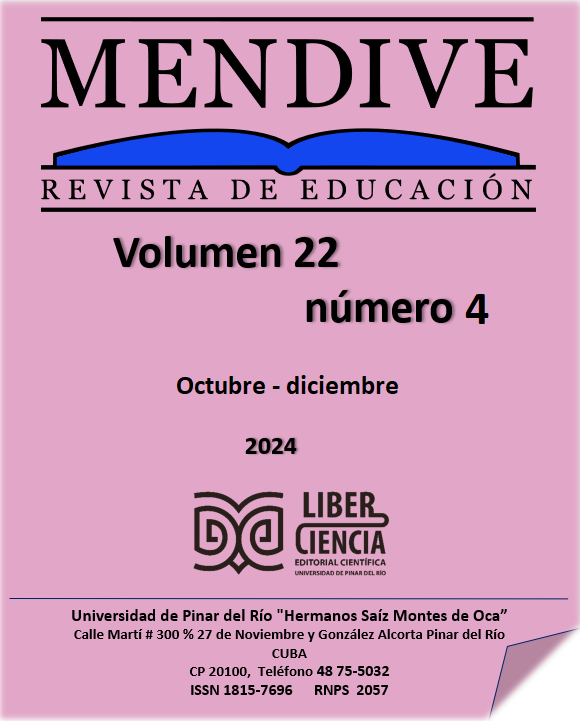Participatory management for successful learning in higher education institutions
Main Article Content
Abstract
The world is constantly changing, making Higher Education Institutions (HEIs) increasingly dynamic scenarios, facing permanent challenges. According to UNESCO, higher education is positioned as the central axis to respond to these challenges. Therefore, promoting participatory management that facilitates the transition from transformational learning to higher learning, as a current paradigm shift at an international level, is a challenge that traces the path to follow for university communities. In this sense, the purpose of this article is to socialize a proposal on the paradigm shift of learning in universities at a global level, highlighting participation as an indispensable principle to achieve it. The study was based on an analysis that used the historical-logical method and analysis-synthesis as fundamental procedures. From this, a reflection was made on participatory management to improve the efficiency and effectiveness of higher learning. The main results show the need and importance of implementing participatory management in Higher Education Institutions to enhance their transformational learning.
Downloads
Article Details

This work is licensed under a Creative Commons Attribution-NonCommercial 4.0 International License.
References
Ballesteros, S. (2022). Sociedades del conocimiento y democratización del saber: agendas pendientes en la construcción de la paz y participación ciudadana. Revista Debates, (88), 134-143. https://revistas.udea.edu.co/index.php/debates/article/view/352024
Bok, D. (2017). Improving the Quality of Education. Inside Higher Ed. 2020 https://www.insidehighered.com/views/2017/09/21/how-improve-quality-highereducation-essay
Cayotopa, C. (2018). Modelo de gestión turística municipal integrada y participativa, para el fortalecimiento de la oferta turística cultural. Revista UCV - Hacer, 7(3). http://revistas.ucv.edu.pe/index.php/UCV-HACER/issue/view/194
Cea, P., García, L., Nail, O., & Paredes, D. (2018). Gestión participativa en directivos para el abordaje de la convivencia escolar en instituciones educativas municipalizadas. Revista Iberoamericana de Educación, 76(2), 153-184. https://doaj.org/article/a93190d83a8543c38849be5d5d0cede8
Córdova Calle, E. A., & Delgado Bardales, J. M. (2020). Gestión participativa en el desarrollo de las instituciones públicas. Ciencia Latina Revista Científica Multidisciplinar, 4(1), 160-201. https://ciencialatina.org/index.php/cienciala/article/view/160
Farray Álvarez, O. (2024). La inteligencia organizacional como vía de innovación en los procesos de dirección. Revista Cubana de Educación Superior, 43(1), 190-204.
Geizzelez-Luzardo, M., & Soto-Gómez, G. (2021). Creatividad, colaboración y confianza: aptitud para la cultura innovativa en las redes de investigación estudiantil. IPSA Scientia, Revista Científica Multidisciplinaria, 6(3), 33-45. https://doi.org/10.25214/27114406.1182
Guía Arias, E. A., Ledo Royo, C. T., & Perera Velázquez, I. (2022). La formación ético-económica en los directivos educacionales. Revista EduSol, 22(Núm. Esp.). http://edusol.cug.co.cu
IESALC - UNESCO. (2018). Conferencia Regional de Educación Superior 2018. Informe general. Disponible en: http://www.iesalc.unesco.org.ve
Salgado Montes, S. S., Flores Lucero, M. L., & Guevara Romero, M. L. (2017). Gestión participativa para mejorar las condiciones de accesibilidad urbana: La Hacienda, Puebla. Nova Scientia, 9(18), 50-72. https://doi.org/10.21640/ns.v9i18.572
Sol Arriaza, R. (2012). El desafío de la participación ciudadana en el estado democrático de derecho y retos de la participación ciudadana en la gestión de políticas públicas, en espacios institucionales de los estados centroamericanos. San José, Costa Rica: ASDI.
UNESCO. (2022). Impacto de la COVID-19 en la educación superior. III Conferencia Mundial de Educación Superior (WHEC2022). Tema 4: Calidad y relevancia de los programas en educación superior. Documento de referencia.


